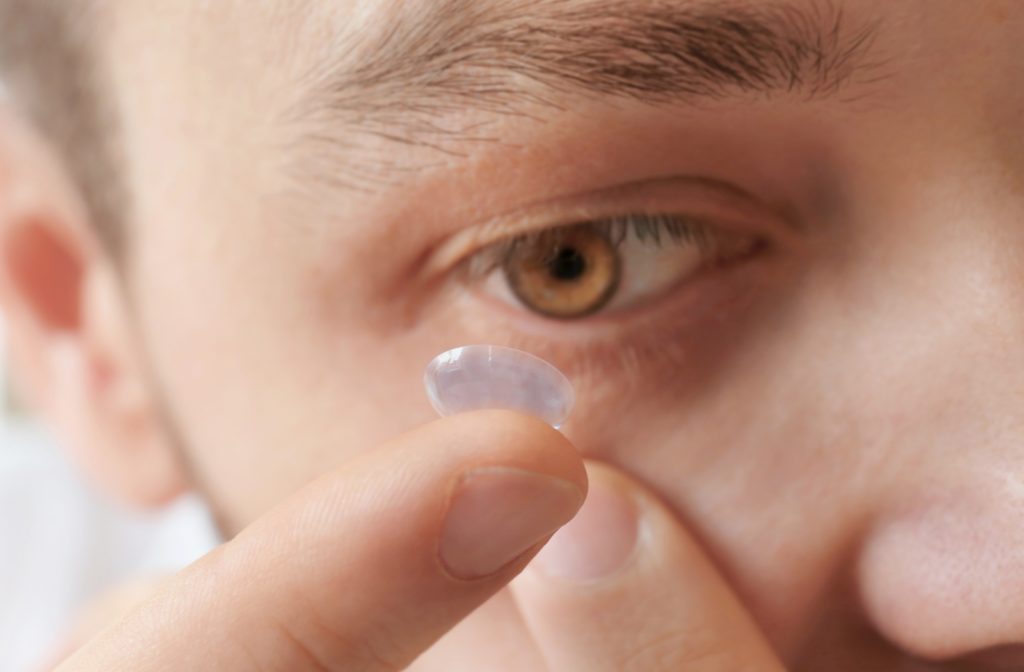Contacts are a great alternative to eyeglasses, but you have more considerations to make when deciding on your lenses. Your contacts need a proper fit, lens size, and the right material. Another choice you need to make is how often you want to replace your lenses; some can range from daily to monthly.
If you’re interested in daily contacts, what are the pros and cons of these lenses? Learn more about daily disposable contacts, including their pros and cons, how they compare to reusable options, and how to know which type of lenses are best for your needs.
What Are Daily Contact Lenses?
Daily contact lenses are soft contacts you replace every day. Daily contact lenses are sometimes called daily disposables.
Soft contacts are one of the most commonly prescribed lenses today and can help several vision problems, including:
These lenses are more comfortable and adaptable than other types of lenses. Soft contacts can be daily disposable or extended wear, such as 2-week and monthly disposable lenses. When looking into daily disposable contacts, what are their pros and cons?
The Pros & Cons of Daily Contact Lenses
There are many considerations to make when deciding if daily contact lenses are right for you. Understanding the benefits and drawbacks of these lenses can help make a final decision.
Pros
There are several benefits to daily contact lenses, including:
Convenience
Daily contact lenses are more convenient than other options. All you need to do is put a new pair of lenses in every morning.
Safer for Your Eyes
Daily contact lenses don’t require any additional care like disinfection or storage when not in use. Protein, calcium, lipids, and other substances can build up on your lens, making your contacts less comfortable and more prone to infection. There is no accumulation of these elements when using daily contact lenses.
Easy-to-Use
Daily contacts can be helpful for people with less experience using contact lenses. Without the need to maintain your lenses, you only need to replace them daily.
Cons
Some of the drawbacks of daily disposable contacts include:
Cost
Daily disposable contact lenses can be more expensive than other options. With time, these lenses won’t be too expensive because you don’t require solution or storage containers, but the initial cost may affect your final decision.
Durability
Daily contact lenses are thinner than reusable options, and this can make them more susceptible to tearing. This thinner material can make your lenses difficult to clean, and they can damage easier. You need to be careful when handling these lenses to avoid potential damage.
Waste
Unfortunately, daily contact lenses create more waste than reusable lenses because you throw out your old pair every day.
There are many considerations to make when deciding if daily disposable lenses are a good choice for your needs. How do these lenses compare to other options available today?

How Do Daily Contacts Compare to Other Lenses?
While all contact lenses provide you with clearer vision, there are many differences between them. Most people have daily disposable lenses or reusable lenses that typically last up to a month of use. Daily contact lenses have several factors differentiating them from reusable options, such as:
- Convenience
- Compliance
- Cost
- Material
Convenience
Daily contact lenses are a more convenient option for many people. You don’t need to worry about keeping your lenses secure; you can throw your pair away at the end of the day. Another benefit is that you don’t need to spend time cleaning your contacts like with reusable lenses.
Compliance
You don’t need to follow detailed care instructions with daily disposable lenses because there’s no need to disinfect and store daily contacts. Wearing daily lenses places you at a lower risk of eye infections than reusable contacts.
Cost
Daily contact lenses are typically more expensive than reusable options due to needing multiple pairs of lenses. However, reusable lenses require storage cases and cleaning solutions which can increase their cost.
Material
While reusable contact lenses have a variety of material options, daily lenses don’t have this luxury. Daily disposables are always soft contact lenses and are typically thinner than reusable options.
How Do You Know Which Lenses Are Best?
Many factors can influence which type of contact lenses are best for your needs. You may have a personal preference for your contacts, or your eye health may affect your ability to wear a specific type of contacts. Your optometrist can help identify your overall eye health during a comprehensive eye exam before recommending the most appropriate lenses for you.
Should You Get Daily Contact Lenses?
Your final decision for contact lenses may come down to personal preference. There are many benefits and drawbacks, no matter what type of contact lenses you choose. If you want the best lenses for your needs, speak with your optometrist. At The Eye Care Centre, we recycle both blister packs and contact lenses at our office. We strive to reduce waste where we can, thanks to a recycling partnership with Bausch + Lomb.After completing an eye exam, they can recommend and fit you with a new pair of contact lenses. If you’re interested in daily contact lenses, book an appointment.



